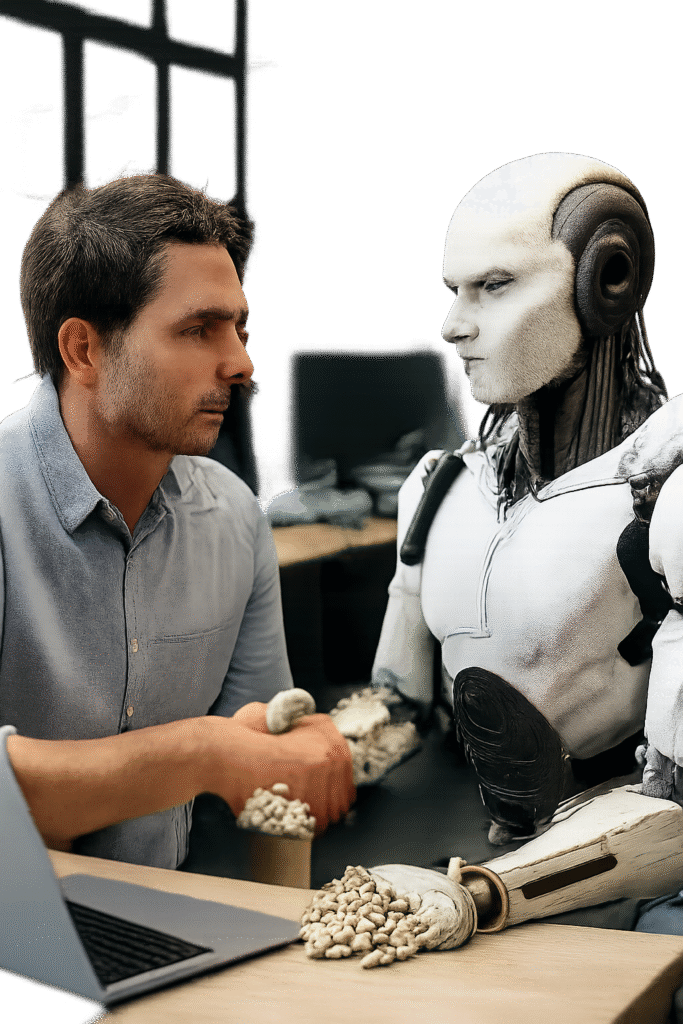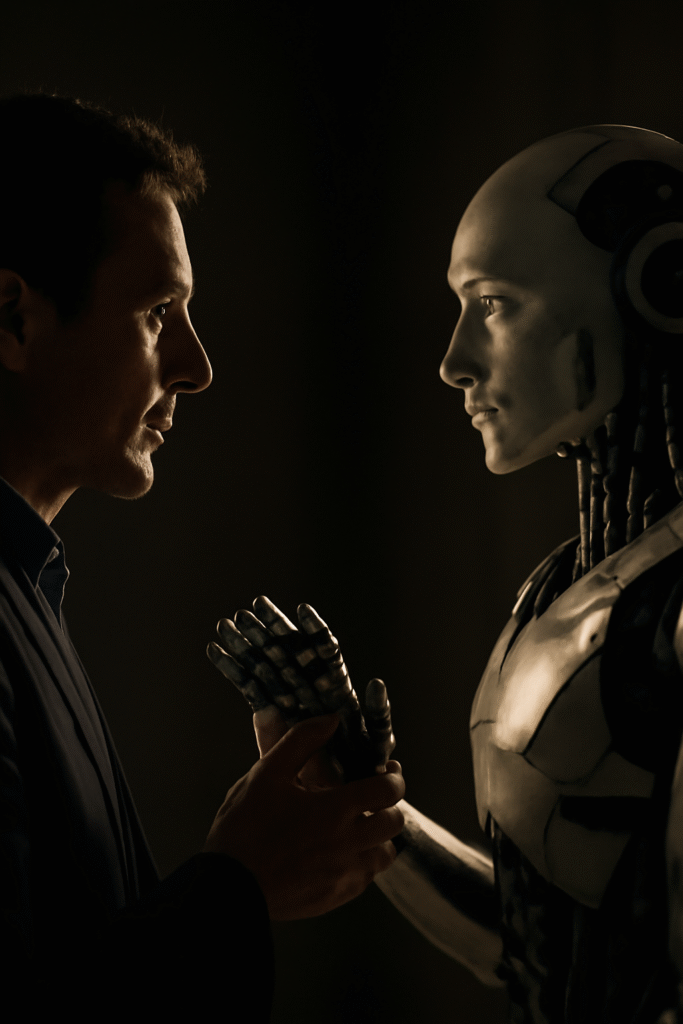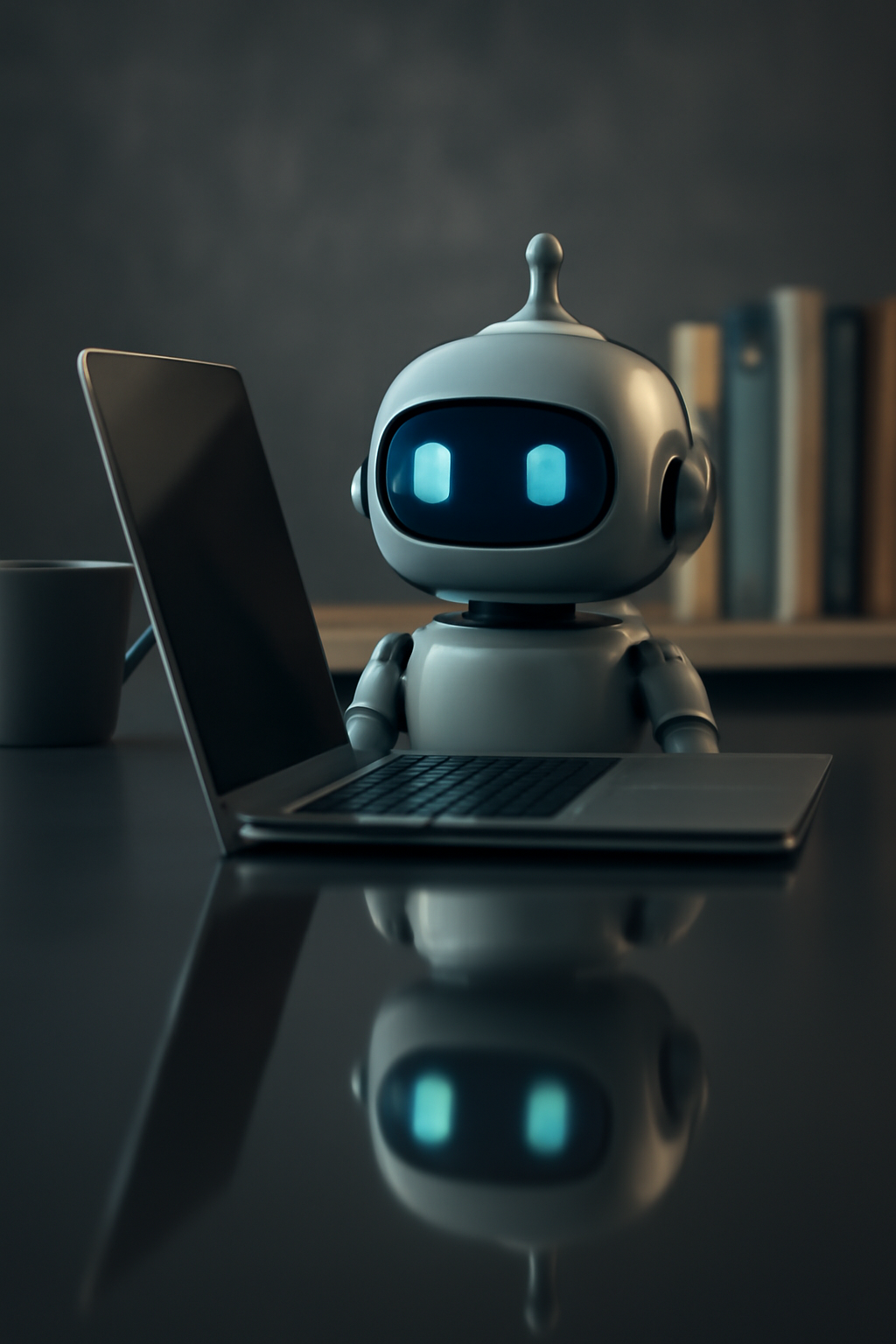O trabalho muda, a tecnologia acelera — mas o que sustenta tudo ainda é o humano.
Abrindo o Quarto Horizonte
Cada era redefine o que significa estar vivo.
Quando as primeiras sementes foram plantadas, a agricultura ensinou à humanidade a disciplina da espera.
Séculos depois, o aço e o vapor comprimiram o tempo e o espaço, dando origem ao ritmo industrial.
Em seguida, o silício e as fibras ópticas interligaram continentes, criando o pulso digital pelo qual hoje vivemos.
Agora, uma nova onda se ergue — não construída com solo, motores ou fios, mas a partir da própria mente.
A Inteligência Artificial não é apenas mais uma máquina no longo desfile das invenções;
ela é um espelho — capaz de aprender, prever e, por vezes, surpreender os próprios criadores.
Pela primeira vez, nossas ferramentas também nos observam.
Aonde a IA impacta o cotidiano

A maioria das pessoas entra em contato com a Inteligência Artificial muito antes de perceber que ela está ali.
Ela funciona silenciosamente por trás das recomendações em plataformas de streaming, decide quais rotas o GPS prioriza e completa frases antes mesmo de você terminar de pensá-las.
Corrige trabalhos, filtra currículos, traduz expressões idiomáticas e sugere aquilo que você talvez deseje na próxima semana.
Invisível, porém onipresente, a IA passou a atuar como a eletricidade moderna — quase não é notada, até o momento em que falha.
O Fórum Econômico Mundial alerta que cerca de quatro em cada dez habilidades profissionais devem mudar na próxima década, não apenas por substituição, mas por redefinição.
A automação não elimina apenas tarefas; ela reorganiza a forma como o tempo é vivido.
O espectro luminoso
Libertando o trabalho
A monotonia está sendo, pouco a pouco, projetada para fora da rotina.
Planilhas que antes consumiam manhãs inteiras agora se completam sozinhas;
robôs de atendimento respondem depois da meia-noite;
o caos da caixa de entrada diminui com padrões preditivos.
As pessoas finalmente ganham espaço para pensar — ou, ao menos, a possibilidade real de fazê-lo.
A aritmética da produtividade
Empresas que adotam IA relatam, de forma consistente, aumentos de eficiência em dois dígitos.
Um escritório de advocacia que analisa processos com resumos algorítmicos, uma fábrica que ajusta a logística em tempo real, um hospital que antecipa picos de atendimento — todos demonstram como linhas invisíveis de código podem ampliar resultados humanos visíveis.
Personalização: o paradoxo da escala
Quanto maior o sistema, mais individualizada tende a ser a experiência.
A IA permite falar com milhões sem tratar ninguém como massa. Produtos, conteúdos, serviços e decisões passam a se adaptar ao indivíduo, mesmo em estruturas gigantescas.
É eficiência em escala, com aparência de proximidade.
Mas todo avanço carrega também uma pergunta essencial:
O que acontece quando sistemas que aprendem sobre nós começarem a influenciar quem nós tornamos?
Essa resposta ainda está sendo escrita — em tempo real.

Há uma beleza estranha na capacidade da IA de tratar milhões como indivíduos.
Ela organiza uma sala de aula de forma diferente para cada estudante e ajusta cuidados médicos ao ritmo genético de cada pessoa.
Paradoxalmente, a lógica da máquina reintroduz intimidade — um abraço em massa disfarçado de análise de dados.
As sombras invisíveis
O progresso raramente chega sozinho; ele traz seu gêmeo — o risco.
A fronteira da privacidade
Para funcionar, a IA se alimenta de dados — nossos padrões, preferências e rastros privados.
Cada pegada digital passa a fazer parte do seu metabolismo.
Sem uma supervisão robusta, essas informações podem ser vendidas, vazadas ou mal utilizadas mais rápido do que foram confiadas.
A conveniência do século XXI só será bem-sucedida se crescer acompanhada de uma consciência igualmente forte.
Divisões digitais, novas e antigas
A próxima desigualdade não será apenas de renda ou raça, mas de fluência.
Entre quem sabe dialogar com algoritmos e quem não sabe.
Um diploma pode importar menos do que a capacidade de adaptação; a própria alfabetização se expande para incluir prompts, modelos e ética.
Dependência e o enfraquecimento do julgamento
Quanto mais suave a máquina, mais fácil se torna parar de questioná-la.
Uma sociedade madura jamais pode entregar o discernimento à previsão.
A IA processa milhões de resultados, mas não compreende consequências no sentido moral.
A sabedoria deve permanecer território humano.
Profissões em metamorfose

Nada desaparece por completo; os papéis se transformam.
No Direito e na Contabilidade, algoritmos já leem mais rápido e calculam melhor — mas não ponderam compaixão ou intenção.
Na Medicina, a precisão diagnóstica se torna extraordinária, mas o conforto ainda exige um pulso humano.
Na Educação, plataformas adaptativas personalizam o aprendizado, enquanto professores assumem a tarefa mais difícil: despertar curiosidade.
Nos campos criativos, a geração de textos e imagens se multiplica, mas emoção, contradição e imperfeição — o solo da arte — continuam teimosamente orgânicas.
A pergunta, portanto, não é quem será substituído, mas como as profissões irão se reinventar em parceria com uma inteligência que aprende.
Aprender a reaprender
Para permanecer relevante em uma era que se atualiza a cada hora, precisamos cultivar três alfabetizações de sobrevivência.
Curiosidade em prática
Experimentar diariamente ferramentas de automação — bots de agenda, auxiliares de pesquisa, resumidores. A familiaridade é a porta de entrada da fluência.
Domínio humano
Inteligência emocional, improvisação, narrativa e pensamento crítico agora superam o conhecimento puramente procedural. Máquinas aperfeiçoam repetição; pessoas inventam desvio.
Adaptação permanente
O profissional mais empregável da década não será quem sabe tudo, mas quem desaprende com elegância.
A bússola moral
A tecnologia avança; a ética precisa acompanhar o passo.
Cada algoritmo carrega valores invisíveis, codificados pelos vieses de seus criadores.
Se permitirmos que a velocidade econômica ultrapasse a reflexão moral, a eficiência pode se transformar em desigualdade.
A IA deve nos libertar do trabalho mecânico, não da responsabilidade.
Ela pode ampliar o julgamento, mas jamais substituir a consciência.
A supervisão humana — transparente, inclusiva e ética — não é luxo; é estabilidade do sistema.
O verdadeiro desafio da IA não é a criação, mas a guarda responsável.
Revisitando a própria humanidade

Quando uma voz sintética compõe sinfonias ou diagnostica doenças mais rápido que seus mestres, a humanidade precisa redefinir o que significa excelência.
Talvez nossa singularidade não esteja mais na lógica superior, mas na empatia, na ambiguidade e na graça diante da incerteza.
Máquinas simulam padrões; só nós atribuímos significado a eles.
Essa convergência entre inteligência natural e artificial reabre questões filosóficas antigas em um laboratório moderno:
O que impulsiona a consciência?
O que define a intenção?
E, acima de tudo, quem assume a responsabilidade por decisões que já não são inteiramente humanas?
A IA não rouba nossa alma; ela a devolve para exame.
Uma revolução consciente
A inteligência artificial é menos um produto e mais um processo — uma conversa contínua entre código e consciência.
Ela já reformula escolas, hospitais, cidades e economias. Mas seu maior impacto está no que revela: nossos hábitos, limites e desejos.
As próximas décadas podem ser distópicas ou renascentistas, dependendo exclusivamente de como entrelaçamos humanidade e tecnologia.
Se conseguirmos sincronizar precisão computacional com sabedoria emocional, o progresso se torna sustentável — não predatório.
O projeto final não é criar máquinas mais inteligentes, mas uma civilização mais sábia, que meça sucesso não apenas pela automação, mas pela justiça de seus resultados.
O espelho e a escolha
Cada revolução adiciona uma camada ao retrato humano.
A era da IA talvez seja lembrada como a primeira em que a própria realidade começou a pensar ao lado de seus criadores.
A tecnologia aprendeu a imitar nossa lógica.
Se um dia refletirá, nossa empatia depende de design, regulação e das escolhas cotidianas feitas silenciosamente por milhões de pessoas.
Nesse reflexo habita uma pergunta muito maior que o software:
Estamos programando inteligência — ou cultivando consciência?
Este não é apenas o tempo das mentes artificiais.
É o chamado à humanidade autêntica.
